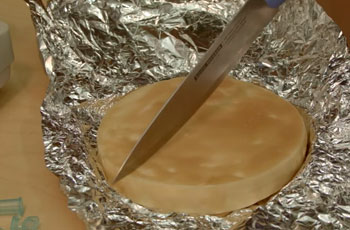Editor’s note: this is an excerpt from the latest edition of BioCoder; it is republished here with permission. Get your free copy of BioCoder Fall 2014 here.

Screenshot from the Real Vegan Cheese Indiegogo campaign video.
That was the call I got from a scientist entrepreneur friend of mine, John Schloendorn, the CEO of Gene and Cell Technologies. He’d been working on potential regenerative medicine therapies and tinkering with bioreactors to grow human cell lines. He left the lab for the weekend, and then something went wrong with one of his bioreactors: something got stuck in it.
“So, I was wondering what happened with my bioreactor and how this big chunk of plastic had gotten in there and ruined my cytokine production run. I was pulling it out, and I thought it was was weird because it was floppy. I threw it in the garbage. A little later, after thinking about it, I realized it wasn’t plastic and pulled it out of the garbage.”
What John had inadvertently done was grow a thick chunk of tissue, about the size of a small ear and about half as thick as your pinky finger.
He called me because he wanted to run an idea by me: do you think we could use this accident to make burgers, if I could reproduce it? Would people eat it?
Yes, in vitro (lab-grown) meat has been the Holy Grail for many decades for tissue engineers, vegans, environmentalists, and many others who have looked upon the archaic and inhumane meat industry with a keen feeling that one day technology will revolutionize this industry, and it’s coming. Groups like New Harvest are supporting the technologies that will free animals from their use as food and still give consumers freedom.
What John did might be revolutionary, as some great accidents are, or might be hard to reproduce after all. So far, that accident has an N=1, but if he’s successful in replicating it, which he’s working on, we could soon have lab-grown hamburgers, not in the $300,000 range but in the $10 range.
The exciting thing is, this is only the start of our post-animal future. It isn’t just the archaic and inhumane meat industry that’s about to fall to the power of science, but also egg farms and the cheese and dairy industries.
Hampton Creek foods is creating plant-based alternatives to eggs, and they’re already selling their super popular Just Mayo in Whole Foods, Costco, and many other places, with more products coming. Counter Culture Labs and Biocurious have successfully raised more than 250% of target on a successful crowdfunding campaign to make animal-free cheeses from GMO yeast. Muufri, a small, SOS-ventures seed-funded biotech company is developing animal-free milk.
For those of you who wonder whether you’d eat a lab-grown hamburger or drink lab-made milk, ponder this thought, which my friend Florian Radke shared:
“Imagine a clean lab production facility with pure sugar, water, and vitamins feeding the meat cell stock, with windows everywhere and accessible to the public, without the mess, blood, and guts of a standard slaughterhouse. Where would you prefer to get your food?”
